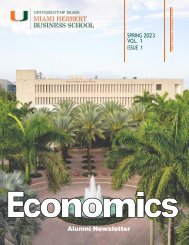Spring 2024 Alumni Newsletter
Create successful ePaper yourself
Turn your PDF publications into a flip-book with our unique Google optimized e-Paper software.
Your coauthor In-Koo Cho<br />
DA:<br />
visited our department and<br />
recently<br />
a paper the two of you<br />
presented<br />
apparently been working on for<br />
have<br />
The title of the paper was<br />
years.<br />
Outcomes Without<br />
"Collusive<br />
Algorithmic Pricing in a<br />
Collusion:<br />
Model." I recall feeling<br />
Duopoly<br />
and perhaps even a little<br />
surprised<br />
by the results he<br />
astonished<br />
I thought it'd be interesting<br />
reported.<br />
follow up on In-Koo's presentation<br />
to<br />
ask you to provide your take on<br />
and<br />
paper. Let me begin by asking<br />
the<br />
Thanks for the question. First,<br />
NW:<br />
bit of context. There is a long<br />
a<br />
in economics looking the<br />
literature<br />
of collusion be firms in<br />
possibility<br />
where they have some<br />
markets<br />
power. Most obvious, and<br />
pricing<br />
illegal, is for firms to enter<br />
clearly<br />
an agreement to set prices<br />
into<br />
than they would in a<br />
higher<br />
setting.<br />
competitive<br />
driving up prices, firms can earn<br />
By<br />
profits. But there is an incentive<br />
more<br />
any one firm to undercut its<br />
for<br />
– cut prices just a bit,<br />
competitors<br />
earn profits on each item sold,<br />
still<br />
capture more of the market and<br />
but<br />
increase total profits. So any<br />
so<br />
agreement must have a<br />
collusive<br />
of punishment to prevent a firm<br />
form<br />
defecting on this collusion.<br />
from<br />
I mentioned that explicit<br />
Now,<br />
agreements are illegal, but<br />
collusive<br />
are myriad ways that firms<br />
there<br />
potentially collude implicitly.<br />
could<br />
example, suppose you and you<br />
For<br />
I are the only suppliers in a<br />
and<br />
and we’ll both be around for<br />
market,<br />
long time as the only suppliers.<br />
a<br />
you move first and set your<br />
Suppose<br />
at a high level. Then while I<br />
price<br />
be tempted to undercut you, I<br />
would<br />
know that in response you’ll<br />
may<br />
me by dropping your price<br />
undercut<br />
below what I set. My<br />
substantially<br />
gain is offset by future<br />
short-term<br />
and so I may rather decide to<br />
losses,<br />
your high price. Even though<br />
match<br />
have not explicitly agreed to<br />
we<br />
the threat of punishment<br />
anything,<br />
mean that collusion can arise as<br />
may<br />
these basic issues have been<br />
While<br />
for a long time, they’ve gained<br />
around<br />
prominence in modern, datarich<br />
new<br />
markets, where an increasing<br />
of firms have turned to<br />
number<br />
pricing algorithms. These<br />
automated<br />
observe market conditions<br />
algorithms<br />
can quite rapidly adjust prices in<br />
and<br />
to the outcomes that they<br />
response<br />
An important question<br />
observe.<br />
both economists, regulators,<br />
facing<br />
policymakers is whether these<br />
and<br />
can learn to collude, and if<br />
algorithms<br />
what should be done about it.<br />
so,<br />
particular background which<br />
The<br />
our paper – although as you<br />
sparked<br />
we’d been working on<br />
mentioned,<br />
ideas for a long time – was a<br />
related<br />
of papers finding that collusive<br />
series<br />
of higher prices could<br />
outcomes<br />
from the interaction of<br />
emerge<br />
algorithms. This work, which<br />
pricing<br />
based on simulations, provided<br />
was<br />
intuitive explanation suggesting<br />
some<br />
the algorithms had ``learned to<br />
that<br />
In-Koo and I wanted to<br />
collude.’’<br />
this in more detail, to<br />
explore<br />
the forces at play in the<br />
understand<br />
of pricing algorithms, and<br />
interaction<br />
characterize precisely and<br />
to<br />
what we could expect in<br />
theoretically<br />
settings.<br />
such<br />
Alright then. Well, it seems to<br />
DA:<br />
that, in the environment you<br />
me<br />
That was our intention. In<br />
NW:<br />
to study the possibility of the<br />
order<br />
of collusive outcomes,<br />
emergence<br />
studied an extreme<br />
we<br />
Dr. Noah Williams on the<br />
Collusion Illusion<br />
Interviewed by David Andolfatto<br />
what this paper is about.<br />
an outcome.<br />
it should be close to<br />
study,<br />
for collusion or collusive-<br />
impossible<br />
like behavior to emerge, no?<br />
where we intentionally<br />
environment<br />
down all of the known<br />
shut<br />
that would facilitate<br />
avenues<br />
collusion.




